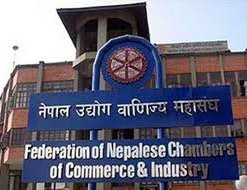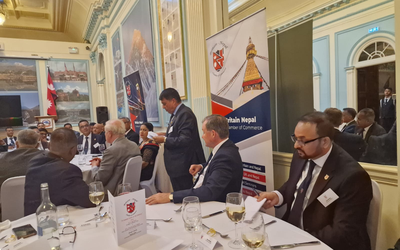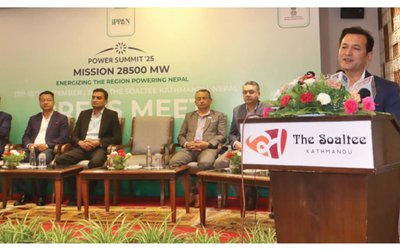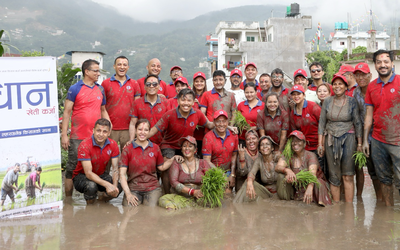
The election is likely to further intensify the differences. As the two contenders, senior vice president and media baron Bhaskar Rajkarnikar, who is a natural contender of president and vice president Pradeep Jung Pandey, are in a nationwide campaign, the industry sector is seeing heated debates on various economic agenda. As both the sides are championing the interest of industrialists, their subtle differences are penetrating among members deep inside. At a time when there is the need to have solidarity and unity to revive the industrial atmosphere in the country, division in FNCCI will further widen after the elections scheduled for April 11
With 12 hours of power cut, growing disputes with trade unions and extortions by political parties and individuals, Nepalese industrial sector has been facing all kinds of trouble and passing through a very crucial time for its survival. As industries are closing down, many banks are publishing the names of industrialists in the list of defaulters.
From amending the Labor Act, easing power cut and guaranteeing safety for industrialists and investors, industrialists need to gather behind a single cause. As the country has been passing through a prolonged phase of political instability, there is the need to have one voice and one sound to create a conducive environment in the industrial sector.
However, the situation is just the opposite. Fractured and bitterly divided, FNCCI is heading for the new elections on April 11 to choose its new leader and executive committee for the coming three years. Indulging in serious personal rivalry in the first round of election campaign, media baron and first senior vice president Bhaskar Rajkarnikar and other vice president Pradeep Jung Pandey have already deeply divided the house of Nepalese business community.
As the current president Suraj Vaidya and former president Ananda Raj Mulmi are backing major contestant Bhaskar Rajkarnikar, first senior vice president and strong contenders for FNCCI’s president and past enemies former president Kush Kumar Joshi and Chandra Dhakal stand with former president Mahesh Lal Shrestha, Binod Kumar Shrestha in favor of vice president Pradeep Jung Pandey, FNCCI’s forthcoming elections will likely to be the toughest one.
Not in any past elections, FNCCI has seen a change in its internal dynamic in such a manner reminding that everything is fair in war and love. With the patch up between previous bitter enemy former president of FNCCI Dhakal and Joshi in favor of Pandey and former president Ananda Raj Mulmi and current president Vaidya’s support to senior vice president Rajkarnikar, the election campaign is reaching all over the country. Vaidya’s support is the major strength of Rajkarnikar panel.
With the support from former president Maheshwor Lal Pradhan, Rabi Bhakta Shrestha, Kush Kumar Joshi and Chandi Raj Dhakal, Pandey is the blue boy of the rainbow coalition. Despite the support of heavy weights to Pandey, media baron Rajkarnikar has comparatively more advantages due to his own personal relations and his own media fame. Rajkarnikar is known more in grass roots level than Pandey because of the media.
Although a tough competition is expected, Rajkarnikar group is in an advantageous position because of the composition of its group. The support of Vaidhya, Golchha and Murarka is a major achievement for Rajkarnikar.
Pandey’s strength is in his promise to bring all rival factions together.
“Only industrialists can understand difficulties of industrialists. Thus, FNCCI members will vote for us,” Dinesh Shrestha, a member candidate in Pandey’s group, said.
As the election campaign of FNCCI spreads nationwide, the individual cost of president candidates has also gone higher. From visiting various districts to addressing the meetings, candidates have to bear huge costs. According to a former senior member of FNCCI, a president’s candidate is likely to bear 20 to 30 million rupees in the campaign cost. As the possibility to choose the presidential candidate on the basis of consensus is slim, the elections will prove more costly in the coming days.
“I will work to unite the FNCCI once the election is over. There is the need of a strong unity among members to pursue the cause of industrialists and business community,” said senior vice president and candidate for president Bhaskar Rajkarnikar, who is reportedly ahead than his nearest rival Pandey.
Rajkarnikar has already announced his panel including Pashupati Murarka as senior vice president, and D.B.Basnet , Udaya Raj Pandey and Shekhar Golchha as the other four vice presidents.
“We have very professional, strong and balanced team on the basis of region and business group,” said Rajkarnikar.
Factionalism
Factionalism in FNCCI is not new. Like any other organization, FNCCI has been ridden by factional politics since its inception. FNCCI averted the elections till the elections of 1995 when Binod Chaudhary and Padma Jyoti contested the elections.
Intellectually and academically sound, Chaudhary and Vaidya’s election campaigns were different from what one can see now. Their election campaigns focused more on Nepal’s economy and overall growth. The present election campaign is more personalized, featuring individual likes and dislikes.
Pandey’s group launched its campaign asking for vote for genuine industrialists, terming Rajkarnikar as a non-industrialist. With the wider support base including traditionally strong business group Golchha and Murarka from east, Rajkarnikar is also able to garn support from traditional business community of Kathmandu valley. Current president Vaidya’s support is another feather in the cap in the head of Rajkarnikar.
Pandey has good backing and support among the traditional community in Kathmandu. However, his panel has many shortcomings. Pandey’s group is reportedly seeking the support of Rajendra Khetan.
Although former president and Nepal’s first Forbes listed billionaire’s support is with another business organization Confederation of Nepalese Industry (CNI), his support will be crucial for the present candidates. Similarly, former president Padma Jyoti has a strong influence in the organisation. Former president Pradeep Kumar Shrestha is enjoying his stint in the golf course rather than taking sides in elections of FNCCI.
No Flavor
The period of Nepal’s first Forbes listed billionaire Binod Kumar Chaudhary and Padma Jyoti remained the golden era for FNCCI. In terms of national and international recognition, they pushed FNCCI to new heights. Pradeep Kumar Shrestha maintained the status quo.
After a long gap, Suraj Vaidya tried to raise the flag of FNCCI. With his personal skills, contacts and capability, he made all out efforts to bring the FNCCI’s glorious days back. By holding international meetings at home, Vaidya pushed FNCCI on the track. Fractured and deeply divided, FNCCI failed to gain momentum.
Having seen all the previous modes of taking part in FNCCI’s internal politics, Rajkarnikar and Pandey might be the last contenders from 1990s generation. Now the time has come to change the guards in the FNCCI’s set up. With the rise of young and dynamic industrialists like Saurav Jyoti making impacts in regional level and global meetings, the young entrepreneurs like Saurav need to be groomed for future leadership.
CNI Way
At a time when FNCCI is busy in holding the nationwide elections dividing the whole structure from top to bottom, Confederation of Nepalese Industry (CNI) has shown otherwise. Appointing Hari Bhakta Sharma as senior vice president, CNI has already chosen a replacement for current president Narendra Kumar Basnyat in the next year’s convention.
At a time when FNCCI’s house is seeing a complete division in the name of democratic exercise, CNI avoided the division by choosing the candidates at the top level on the basis of consensus. “We held the elections at the local level but we want to see the leadership as a unanimous choice,” said president Narendra Kumar Basnyat. “We don’t want to invite factionalism and division at the leadership level.”
FNCCI’s Future
Being the second oldest business organization after Nepal Chamber of Commerce, FNCCI has a large network. It has 93 organizations at district and municipal level industry and commerce unit, 91 commodities organisations, 20 bilateral and 607 associated members.
Although Rajkarnikar and Pandey both claim that they will work to bring all the groups together following the elections, this is unlikely given the long factional history of FNCCI. Recently, political ideology is gradually invading the FNCCI’s elections.

Keshab Poudel
Poudel is the editor of New Spotlight Magazine.
- ERC Nepal Is Focused On Expanding Distribution And Transmission To The Private Sector: ERC Chair Dr. Dhital
- Jul 06, 2025
- FOURTH PROFESSOR Y.N. KHANAL LECTURE: Nepal-China Relations
- Jun 23, 2025
- Colonel JP CROSS: Centenary Birthday
- Jun 23, 2025
- BEEN: Retrofitted For Green
- May 28, 2025
- GGGI has been promoting green growth in Nepal for a decade: Dr. Malle Fofana
- May 21, 2025















